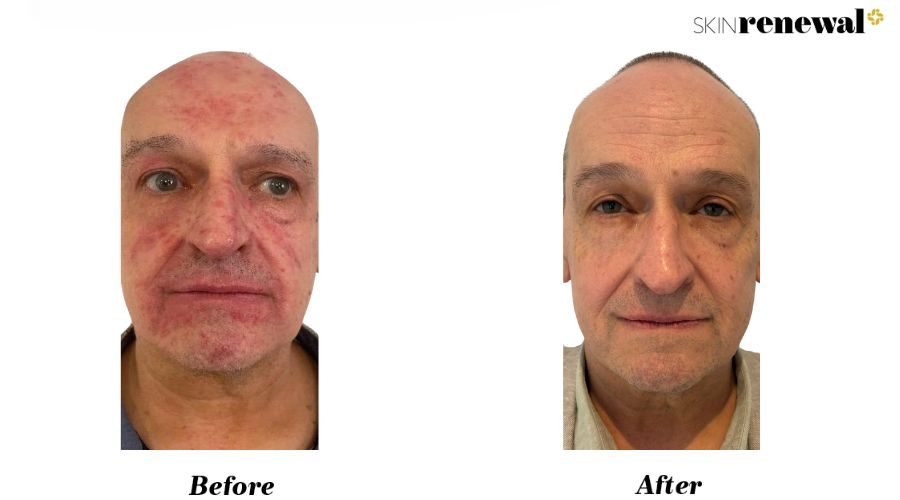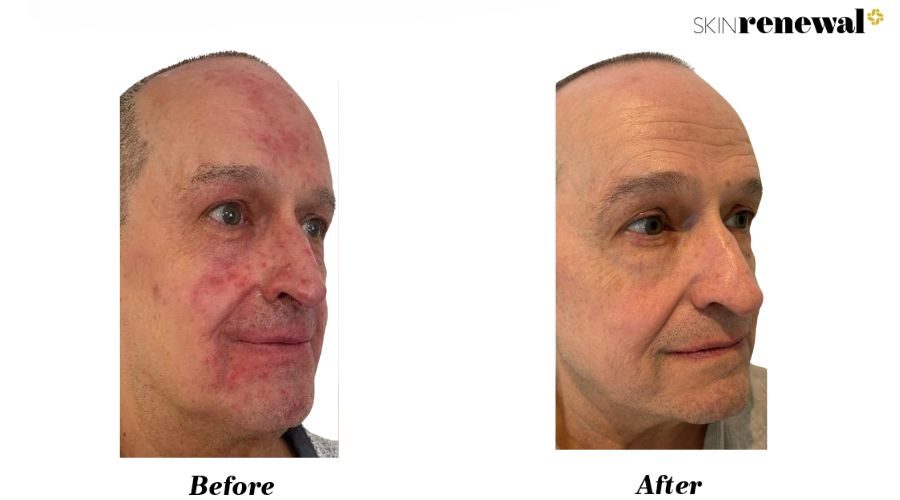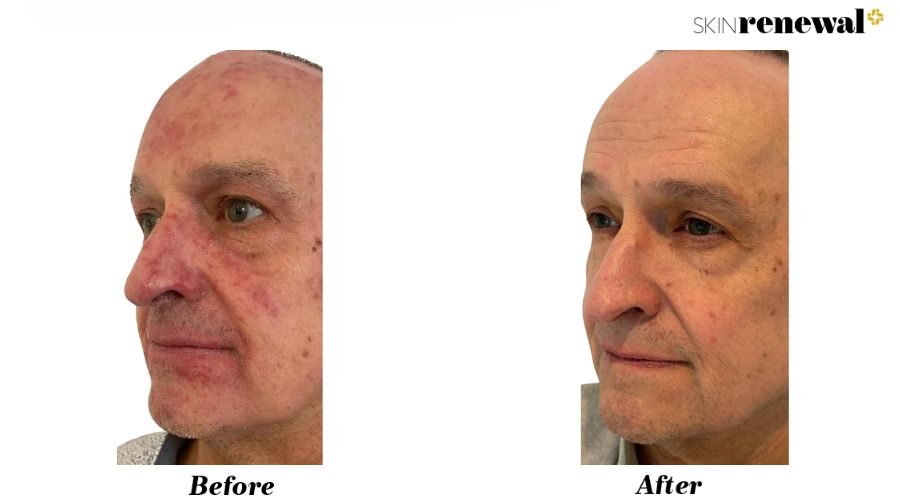
Pigmentation & Discolouration
Age Spots Discolouration Hormonal Pigmentation / Melasma PIH Sun Damaged SkinSensitive & Reactive Skin
Eczema (Dermatitis) Ingrown Hairs - Razor Bumps Perioral Dermatitis Rosacea / Red Skin Sensitive SkinSkin Concerns in Dark Skin Types
Acne in Dark Skin Dermatosis Papulosa Nigra (DPN) Melasma / Pigmentation In Dark SkinSkin Lesions & Growths
Keloids Onychomycosis (Nail Fungus) Pre-Cancerous Skin Lesions Scars & Scar Removal Sebaceous Hyperplasia Skin Tags Syringoma Warts Wound HealingGeneral Skin Health & Types
Four Primary Skin TypesFace, Neck & Chest
Lax / Loose Skin Prejuvenation Sagging Face Skin & Ageing Sunken Cheeks Volume Loss WrinklesLower Face & Mouth
Ageing Lips Double Chin Downturned Mouth Marionette Lines Nasolabial Folds Smoker's LinesUpper Face & Eyes
Bunny Lines Eye Bags Eye Wrinkles / Crow's Feet Sagging Brows Under Eye Dark CirclesAgeing Skin & Conditions
Ageing Décolleté Ageing Hands Ageing Neck Spider Veins Stretch Marks (Striae)Botulinum Toxin Injections
Botox ® & Dysport ® Brow Lift Palmar Hyperhidrosis Reasons Botulinum Toxin Might Wear Off Too Soon Treatment for Gummy Smile Treatments for Bruxism / TMJ Underarm HyperhidrosisTargeted Filler Treatments
3D Liquid Facelift Hand Rejuvenation Jawline Reshaping Lip Enhancement Magic Needle Mesolift MD Codes™️ Nefertiti Contour Neck Lift Non-Surgical Nose Job Plantar Foot Pad FillerInjectable Mesotherapy
Biopuncture Cecarrelli Fat Lipolysis Fat Burning Injections Mesotherapy Mesotherapy for Eye Bags Platelet-Rich Fibrin (PRF) PRP for Hair Loss Vampire Facial (PRP)Subcision
Acne Scar ReductionCutera
Acutip 500™ CO2 Laser Resurfacing Contact Yag Cutera Lasers Laser Genesis™ Rejuvenation Laser Hair Removal Laser Vein Removal Long Pulsed ND:Yag Nd:Yag Skin Tightening Pearl Fractional Pearl Fusion Pearl™ Rejuvenation Titan® Skin TighteningRadiofrequency
Accent ™ Endymed 3Deep RF Tightening Exilis Elite Heat & Sound Technology Lavatron Multipolar vs Monopolar TitaniaSignature Treatments
Acne & Rosacea Facial Microtox Glow Facial Nasolabial Lift Treatment Star Gaze Eye TreatmentChemical Peels
Chemical Peels Overview Dermaplaning Eye Peel Treatment Intense Peels & Laser Peels MesoBrite™ MicrodermabrasionBody Shaping & Contouring
Body Contouring Carboxytherapy for Body Cellulite Solutions Cryolipo Fat Freezing Endymed ContourWeight Loss Solutions
Renewal Institute Diet (RID)Skin Nutrition & Topicals
Dietary Advice for Dark Circles Hydroquinone Metformin Nutrition for Skin Serums & Topical IngredientsDermatological Treatments
Carboxytherapy Carboxytherapy for Hair Loss Cryotherapy Surgical Mole Removal
Several factors, both genetic and environmental, can exacerbate the condition. Triggers that increase blood flow to the surface of the skin, like hot and spicy foods, alcohol, and exposure to sunlight, are among the most common. Avoiding activities or ingredients that provoke an inflammatory reaction is key to managing rosacea. Managing one’s general health, including gut health, sleep, and inflammation, all assist in managing the symptoms of Rosacea.
Much like autoimmune conditions, Rosacea can flare up and subside, causing frustration for those affected. Triggers include environmental factors, certain foods, and lifestyle choices. Common aggravators include:
Temperature extremes (avoid sitting in front of fires or long sun exposure)
Sunlight exposure
Stress
Strenuous exercise
Hot baths, saunas, steam rooms
Chlorine in swimming pools
Corticosteroids and certain medications
Dietary factors, such as sugar, gluten, hot spices, and alcohol
If left untreated, rosacea can progress and worsen over time, often being mistaken for other skin conditions like eczema or skin allergies.
At Skin Renewal, we understand that rosacea requires ongoing management. Our three-step approach ensures that every aspect of the condition is addressed:
In-Clinic Treatments: Target Rosacea symptoms with specialised therapies.
Home Care Regimen: Maintain treatment results with physician-recommended skincare products.
Oral Supplements: Reduce systemic inflammation to calm skin redness and flare-ups.
At Skin Renewal, we believe in treating Rosacea holistically. Each patient undergoes a detailed consultation with our experienced medical doctors, who will take a comprehensive history to identify any underlying medical conditions contributing to the Rosacea. Conditions like low stomach acid, dysbiosis, and leaky gut often have systemic effects, including triggering skin conditions like Rosacea. If these underlying issues are not addressed, they may lead to future health problems such as autoimmune disorders, food sensitivities, allergies, and even digestive issues.
Our doctors perform thorough assessments and may recommend further tests, such as a Betaine HCl acid test, to check stomach function. Addressing internal imbalances ensures we treat Rosacea topically and tackle the root causes of inflammation. Combining in-clinic treatments and internal health support leads to long-lasting results and healthier skin.
At Skin Renewal, we often recommend a combination of therapies for rosacea treatment because no single treatment can address all the complexities of this condition. By combining different approaches, we can target various layers of the skin, reduce inflammation, and improve skin health from within. This comprehensive strategy ensures optimal outcomes for our patients, improving their skin appearance and overall well-being.
Our in-clinic treatments for Rosacea include advanced technologies designed to improve skin appearance and minimise flare-ups. Some of our offerings include:
Limelight™: Targets pigmentation and redness.
Laser Genesis™: Reduces inflammation and smoothens the skin.
PDT (Photodynamic Therapy): Repairs damaged skin cells.
Transdermal Mesotherapy: Infuses actives to reduce redness and sensitivity.
RF Needling (Secret RF or Endymed Intensif): Stimulates collagen production for firmer skin.
Azelaic Acid Peel: Treats both redness and acne-like symptoms of rosacea.
Skin Renewal offers a holistic, doctor-led approach to treating Rosacea. Our treatment plans combine in-depth consultations, advanced in-clinic treatments, and supportive home care. Identifying and addressing underlying health issues ensures that your Rosacea treatment plan is effective and long-lasting.
Treatments for Rosacea are available in Gauteng at the Morningside, Parkhurst, Rosebank, Bedfordview, Fourways, West Rand, Irene, Waterfall, Irene, Lynnwood and Brooklyn clinics, as well as in the Western Cape at Cape Quarter, Claremont, Constantia, Century City, Stellenbosch, Paarl and Willowbridge clinics, and Kwa-Zulu Natal at the Ballito, Durban and Umhlanga clinics.
Certain foods can trigger rosacea flare-ups by causing inflammation in the body. Common food triggers include spicy foods, alcohol (especially red wine), hot drinks, foods high in sugar, gluten, and dairy. Some people with Rosacea may also experience flare-ups from foods containing histamines, such as aged cheeses and processed meats. To manage Rosacea, monitoring your diet and avoiding known irritants is essential.
Stress is a well-known trigger for rosacea flare-ups. While stress does not cause Rosacea, it can exacerbate the condition by increasing inflammation and flushing in the skin. Managing stress through relaxation techniques, adequate sleep, and stress-reducing activities can help reduce rosacea symptoms and prevent flare-ups.
Rosacea is a chronic condition that typically does not go away on its own. Without treatment, symptoms may worsen, leading to more severe redness, visible blood vessels, and skin sensitivity. However, proper management, including treatments and lifestyle adjustments, can significantly reduce and control Rosacea symptoms.
Rosacea tends to affect adults between 30 and 60, particularly those with fair skin. Women are more commonly diagnosed with Rosacea; however, men can experience more severe symptoms. Individuals with a family history of Rosacea or sensitive skin are likelier to develop the condition.
While Rosacea cannot be cured, its symptoms can be effectively managed with the right treatments and lifestyle modifications. Many patients can keep Rosacea under control and reduce flare-ups over time with a combination of medical therapies, skincare products, and diet adjustments. Regular treatment is essential to prevent Rosacea from worsening.
Hot drinks, including coffee, can trigger Rosacea symptoms due to the heat, which increases blood flow to the skin's surface. However, if the coffee is consumed at a cooler temperature, it may be less likely to cause a flare-up. Some patients also find that caffeine may irritate their skin, so monitoring individual responses and adjusting accordingly is essential.
Treatments for Rosacea are available in Gauteng at the Morningside, Parkhurst, Rosebank, Bedfordview, Fourways, West Rand, Irene, Waterfall, Irene, Lynnwood and Brooklyn clinics, as well as in the Western Cape at Cape Quarter, Claremont, Constantia, Century City, Stellenbosch, Paarl and Willowbridge clinics, and Kwa-Zulu Natal at the Ballito, Durban and Umhlanga clinics.
Certain foods can trigger rosacea flare-ups by causing inflammation in the body. Common food triggers include spicy foods, alcohol (especially red wine), hot drinks, foods high in sugar, gluten, and dairy. Some people with Rosacea may also experience flare-ups from foods containing histamines, such as aged cheeses and processed meats. To manage Rosacea, monitoring your diet and avoiding known irritants is essential.
Stress is a well-known trigger for rosacea flare-ups. While stress does not cause Rosacea, it can exacerbate the condition by increasing inflammation and flushing in the skin. Managing stress through relaxation techniques, adequate sleep, and stress-reducing activities can help reduce rosacea symptoms and prevent flare-ups.
Rosacea is a chronic condition that typically does not go away on its own. Without treatment, symptoms may worsen, leading to more severe redness, visible blood vessels, and skin sensitivity. However, proper management, including treatments and lifestyle adjustments, can significantly reduce and control Rosacea symptoms.
Rosacea tends to affect adults between 30 and 60, particularly those with fair skin. Women are more commonly diagnosed with Rosacea; however, men can experience more severe symptoms. Individuals with a family history of Rosacea or sensitive skin are likelier to develop the condition.
While Rosacea cannot be cured, its symptoms can be effectively managed with the right treatments and lifestyle modifications. Many patients can keep Rosacea under control and reduce flare-ups over time with a combination of medical therapies, skincare products, and diet adjustments. Regular treatment is essential to prevent Rosacea from worsening.
Hot drinks, including coffee, can trigger Rosacea symptoms due to the heat, which increases blood flow to the skin's surface. However, if the coffee is consumed at a cooler temperature, it may be less likely to cause a flare-up. Some patients also find that caffeine may irritate their skin, so monitoring individual responses and adjusting accordingly is essential.



